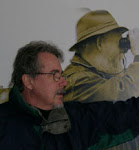How Sacred Literature
Finds You
While staring out of the library window
of Gannon College in Erie, Pennsylvania where I was an undergraduate
English major in the contemporary novel seminar of the brilliant Dr.
John Roach, I saw a bus pulling into the Greyhound Station. On that
bus was Augie March, the eponymous character in Saul Bellow's “The
Adventures of.”
I was Augie March, and Mr. Bellow knew
me pretty well. Here's how Augie narrated our story:
Thinking this, I
told the telegraph girl to forget about the wire, I was leaving town.
[Buffalo.]
Not to be picked
up on the road in northern New York, I took a ticket to Erie at the
Greyhound Station, and I was in the Pennsylvania corner that evening.
To get off in Erie gave me no feeling that I had arrived somewhere,
in a place that was a place in and for itself, but rather that it was
one which waited on other places to give it life
by occurring between them, the breath of it was thin, just
materialized, waiting. . .
However, as I felt
on entering Erie, Pennsylvania, there is a darkness. It is for
everyone. You don't, as perhaps some imagine, try it, one foot into
it like a barbershop “September Morn.” Nor are lowered into the
weeds inside a glass ball to observe the fishes. Nor are lifted
straight out after an unlucky tumble like a Napoleon from the mud of
the Arcole where he had been standing up to his thoughtful nose while
the Hungarian bullets broke the clay off the bank. Only some Greeks
and admirers of theirs, in their liquid noon, where the friendship of
beauty to human things was perfect, thought they were clearly divided
from the darkness. And these Greek too were in it. But still they are
the admiration of the rest of the mud-sprung, famine knifed,
street-pounding, war-rattled, difficult, painstaking, kicked in the
belly, grief and cartilage mankind, the multitude, some under a
coal-sucking Vesuvius of chaos smoke, some inside a heaving Calcutta
midnight, who very well know where they are.
And I was in Erie, Pennsylvania on the
day when I read that passage and in many ways still am although the
weather is much more like the Bay area of San Francisco's.
Some time later that same week, my
memory tricks me into believing, I met the famous New York guru, Baba
Ram Dass, at Mercyhurst College and heard him answer a question about
which were the “sacred” texts. His answer was quietly uttered,
“Sacred . . . books . . .are . . . uniquely . . . sacred . . .
to each . . . individual. . . . You . . .know . . . them . . . when
. . . you . . . come . . . across them. . . . In a sense . . .they
. . . seek . . . you . . .out.”
What made me think of all of this
today, is that the above pictured book miraculously found its way
back in the trunk of my car at the bottom of a recycled “Trader
Joe's” shopping bag. Apparently my wife had plucked it from a
“sharing tree” in Portand, Oregon many weeks ago along with a
half dozen, assorted children's books. And I believe that Saul Bellow
had left those pages from Augie's journal entry for me to find across
the street from that same Greyhound Station those many years before.
And I believe that all the arts become
sacred when they catch our reflections deep within their mirrored
surfaces and lead us in directions that we would not otherwise have
imagined and that their creation and study can be an ends rather than
just a means in the fulfillment of our lives. This last sentence I
heard from Dr. Roach himself.




No comments:
Post a Comment